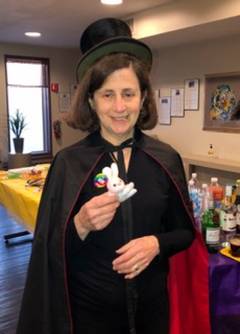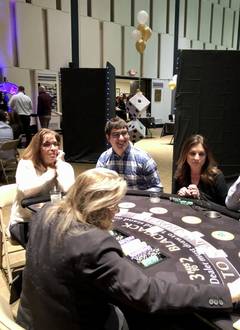Kol Nidrei 5783: The Heart Knows the Bitterness
10/06/2022 11:52:27 AM
Rabbi Ben Goldberg
| Author | |
| Date Added | |
| Automatically create summary | |
| Summary |
My senior year of college, some Jewish students on my campus faced a dilemma. You see, Yom Kippur that year was a Saturday. It so happened that there was also a major football game at home that day, with the attendant tailgating and other events that made it a major social occasion. For me personally, this was not a conflict: I generally ignored the football scene to begin with, and would have made the choice to fast and be in services all day anyway. But this was a conflict for many others on campus, including the university’s fairly observant Jewish president. He was able to get the game moved from the morning to the late afternoon, but even he was powerless to totally reschedule the game, when faced with the almighty god known as ESPN.
So, people responded in various ways. I was Hillel President at the time, and the situation led to some odd requests, including that we hold a Ne’ilah service in the stadium. (We didn’t.) Some students went to morning services and then the game. There were even others who, I learned, fasted from noon on Friday to noon on Saturday so they could get a full day of fasting in, and then joined the game-day festivities. And, sure enough, careful observers noticed the university president cheering from the sidelines during the game as usual, but inconspicuously cracking open a bottle of water at precisely the moment Yom Kippur ended.
I mention all of this to point out just how important fasting on Yom Kippur is, both as a spiritual practice and as a token of Jewish identity. The importance of this practice, sanctified by the millennia, comes from our Torah reading for tomorrow: “On the tenth day of the same seventh month you shall observe a sacred occasion when you shall afflict your selves,” literally, your throats. Our tradition offers many explanations for why we fast on this day. For me, this practice underscores our embodied nature. Judaism is not just a set of intellectual or spiritual propositions, but also something we do with our bodies, the same bodies that can bring us to the greatest levels of holiness, and also lead us into temptation and sin. We fast precisely to feel our creaturely nature so that we can then transcend it, to show, both to God and to ourselves, that we are capable of self-control in this most basic realm and therefore in others, as we enter this new year vowing to be better versions of ourselves.
Given the importance of fasting on Yom Kippur, an interesting question arises: who does not need to fast? You are probably aware that children do not fast, and neither do people for whom fasting would potentially harm their health. But, Jewish law had to answer the question: how do we draw the line between a fasting that is merely unpleasant and a fasting that is potentially harmful?
The Talmud (Yoma 8:5; 82a) begins its discussion of this question by saying that we defer to medical experts about who needs to eat. Or, in the absence of such experts, we rely on people’s own assertion that they need to eat. The presumption is that Jews, as my story illustrates, deeply feel the need to fast on Yom Kippur and will only exempt themselves if they truly cannot fast safely.
But what happens in the case of a conflict between the sick person and the experts? What if the ill person says he needs to eat, but his doctors say he does not? A later authority clarifies that we take the lenient approach by listening to the ill person, even against the advice of his doctors. Why? That authority quotes from Proverbs: “the heart knows the bitterness of its soul.” People can be trusted to know their own bodies, their own situations, their own spiritual and physical needs and how that all balances out. If they say they cannot fast, they eat, regardless of what some expert says. End of discussion. The heart knows the bitterness of its soul. People can be trusted to be experts on their own life experience.
We gather this Yom Kippur in a country where, for the first time in decades, there is no constitutional guarantee to abortion. This summer’s Supreme Court ruling that overturned Roe vs. Wade came as a shock to those of us who assumed, perhaps naively, that such rights were settled law. Fortunately, nothing has changed yet here in New York, where state laws provide for access to abortion. But this decision opens the door to a reality, already the case in much of the country, where abortion is extremely difficult or all but impossible to access.
I’ve chosen to speak about abortion tonight because I know this issue matters to many of you, as it does to me. If we believe the statistics, it is quite likely that multiple people in this room, or someone they love, have sought abortion care at some point in their lives. Yes, nice Jewish girls get abortions, sometimes under heartbreaking circumstances and sometimes just because they don’t want to be pregnant. So this issue might feel very personal to you. It feels very personal to me, too. There is one person in my extended family who was unable to access a safe abortion, with life-altering consequences. And there’s another who chose to end a pregnancy that was very much wanted because of specific circumstances that arose.
The dominant Jewish perspective on abortion, as developed through our legal tradition from the Torah forward, tends to be much more permissive than what generally passes for the religious point of view in this country. There is wall-to-wall agreement among authorities of Jewish law that there are at least some circumstances where abortion is permissible, and that the life and well-being of the pregnant person takes priority than the potential life of the feutus she carries.
What is a matter of dispute is the range of circumstances in which abortion is permitted. Everyone agrees that pregnancies that threaten the life of the mother can be terminated, even just before birth. But there are some authorities, including some very Orthodox ones, who permit abortions on the basis of a wider range of concerns about health and well-being, including mental health. For example, the 18th century authority Rabbi Yaakov Emden permitted abortions to prevent great emotional pain that might result from a prengancy. And, as my colleague Rabbi Danya Ruttenberg, one of the leading voices on this issue, points out, it is hard to imagine any situation where someone is pregnant, and doesn’t want to be, NOT resulting in great emotional pain and distress.
It is on this basis that abortion restrictions are of concern to Jews specifically. It is already the case that some states have or could soon have laws that prohibit abortions in situations where Jewish law and ethics unquestionably permit them. Arguably this infringes upon our right to follow our own legal and ethical traditions in this most sensitive, personal and arguably religious of matters. A synagogue in Florida has even sued that state on this basis, and I will be fascinated to see how that case plays out.
Tonight, on this solemn night of reflection, I’d like to go even further. You see, while everything I’ve laid out about Jewish points of view on this topic is true, there is a major limitation to it. It is still based in the legal paradigm of permitted and prohibited. This is what some call the justification approach to abortion, where someone need a good reason, whatever that might be, in order to justify the procedure.
For sure, this is the basic approach of Jewish law to most questions. But this paradigm still puts the choice in the hands of someone other than the most impacted person. As the Jewish ethicist Dr. Michal Raucher writes, “Unless you support a person’s right to bodily autonomy, then you are supporting a system wherein someone else determines what you or anyone else can do with their bodies. It does not matter whether that person is a lawmaker, a judge, a contemporary rabbi or one from 2,000 years ago. It does not matter whether that person would permit most abortions or even require some.”
Nowadays, some people like Dr. Raucher, especially in the human rights world, talk about bodily autonomy as the overarching principle regarding abortion and similar topics. Bodily autonomy is the straightforward notion that every person has the right to determine what happens to his or her body, especially with regard to matters of reproduction, sexuality, gender, and health care, among other domains. Can a Jewish case be made for bodily autonomy?
On first glance, the answer would appear to be no. Jewish thinking tends to see our bodies as a sacred gift, on loan from God and entrusted to our care. From this fundamental belief flows the standard Jewish positions on many questions related to our physical bodies. On the one hand, there are things we might want to do with our bodies, like tattooing, autopsies, and suicide, that Judaism tends to frown upon, no matter how badly we want to do them. (Now, as an aside, even as Judaism frowns upon tattooing, it is a myth that you cannot be buried in a Jewish cemetery if you have a tattoo. I should also say, since I mentioned it, that nowadays, many Jewish authorities understand that suicide often results from mental illness. Therefore, those whose illness leads them to take their own lives should not be held morally responsible, just as cancer patients are not morally responsible for their cancer.)
On the other hand, there are certain things that Judaism expects us to do with our bodies, such as circumcision, regardless of how anyone feels about it. Here I will also say, since I mentioned it, that I do believe that it is ethical for parents to circumcise their sons, even without the infants’ consent, which of course cannot be obtained. While this is an irreversible choice with lifelong consequences–as is not circumcising in infancy–so is everything a parent does, including bringing a child to the world in the first place. That is what it means to be a parent: to make such irreversible choices on behalf of one’s children.
Despite this fact pattern from the Jewish tradition, can we make an argument for bodily autonomy on the basis of Judaism? To answer that, let us return to where we began and the question of who must eat on Yom Kippur. Rabbi Becky Silverstein, whose writing drew my attention to these sources, suggests that this concept can have much broader application. If “the heart knows the bitterness of its soul,” if people can be trusted to be their own experts when it comes to the most intimate aspects of their embodied lives and spiritual practice, then perhaps this can apply to the most sensitive questions of abortion as well. Perhaps we can make space in Jewish ethics for someone to say: I know my situation best, and an abortion is the best choice in it, no matter what any rabbi, ancient or modern, or any politician or judge thinks.
I must say that I was quite surprised to find this line of thinking in the Jewish legal literature. It probably falls short of bodily autonomy as an absolute principle that we find in human rights discourse. But it does suggest that there can be space within Jewish law and ethics, at least sometimes, for deferring to an individual’s best judgment on how to handle a sensitive situation.
Unfortunately, the shift in the legal landscape surrounding abortion has increased the bitterness in many people’s hearts and souls. So: where do we go from here? The National Council of Jewish Women is the Jewish community's leading voice on this issue. Through them, you can donate to the Jewish Fund for Abortion Access, which provides a Jewish outlet for tzedakah to help people pay for abortions they need. The NCJW also provides other advocacy tools. If you are interested in working on this issue as part of KTI, please be in touch with me after the holiday and we can see what we can put together.
The fast that many of us begin this evening puts us in touch with our creaturely nature. While we might imagine that we ascend to angelic heights for these 25 hours, the rest of the time, we have bodies: beautiful, imperfect, bodies, bodies that need food and rest and pleasure, bodies from which all kinds of substances emerge, bodies that give us the miraculous, Divine power to create and sustain life. Hayom t’amtzeinu: may this day strengthen us to listen to the wisdom of our bodies, to know what they need, and to inspire us to create a world where every body is trusted to determine what it needs to thrive. Amen.
Sun, November 2 2025
11 Cheshvan 5786
Photo Gallery
Photo Albums
Upcoming Events
-
Wednesday ,
NovNovember 5 , 2025Rabbi, May I? Modern Responsa
Wednesday, Nov 5th 10:00a to 11:30a
Wednesdays, 10 - 11:30 AM, KTI Library Ever since Abraham’s famous argument with God, Judaism has been full of debate. Moses and Korah, David and Nathan, Hillel and Shammai, the Vilna Gaon and the Ba’al Shem Tov, Spinoza and the Amsterdam Rabbis . . . the list goes on. No wonder that Judaism cherishes the expression machloket l’shem shamayim, “an argument for the sake of heaven.” Beyond their historical importance, what makes these disputations so compelling is that nearly all of them, regardless of their epochs, are still being argued. The parade of characters spanning three millennia of biblical, rabbinic, and modern disputation reflects the panorama of Jewish history with its monumental political, ethical, and spiritual challenges. This series will examine Jewish responses to exile from the biblical period to our modern day. Considering texts from all genres of Jewish literary creativity, we will explore how the realities and iterpretaions Join as we re-open these timeless debates that lead us to the core of 3,000 years of Jewish conversation. • Justice: Abraham vs. God (October 19) • Holiness and Authority: Moses vs. Korah (November 9) • Inclusion: The Five Daughters vs. the Twelve Tribes (November 30) • Accountability and Morality: David vs. Nathan (December 21) • Resistance: Ben Zakkai vs. the Zealots (January 18) • Law: Hillel vs. Shammai (February 15) • Spirituality: The Vilna Gaon vs. the Baal Shem Tov (March 15) • Boundaries: Spinoza vs. the Amsterdam Rabbis (April 19) • Religious Evolution: Geiger vs. Hirsch vs. Frankel (May 10) • Zionism: Herzl vs. Wise (May 31) -
Thursday ,
NovNovember 6 , 2025Coffee with the Rabbi
Thursday, Nov 6th 8:00a to 9:00a
Start your morning with some caffeine and casual or meaningful conversation! Join Rabbi Goldberg for a Coffee Chat! Stop by Rye Ridge Starbucks any of the following Thursdays, between 8-9am: June 12 and 26 July 10 and 24 August 7 and 21 September 4 and 18 October 16 and 30 November 6 and 20 December 4 and 18 -
Thursday ,
NovNovember 6 , 2025Janet Heiser Game Night 2025
Thursday, Nov 6th 7:00p to 9:00p
Bring your friends for a night of Mah Jongg, Canasta, Bridge and prizes! Thursday, November 6th at 7:00pm KTI Social Hall $30 per person ($36 per person after Nov. 3) in memory of Janet Heiser, whose tireless effort helped to strengthen Jewish connections and continuity at KTI and the greater Jewish community Co-Chairs Pam Kaplow - pdougk@aol.com Laurie Landes - lrl52@aol.com -
Friday ,
NovNovember 14 , 2025Give Thanks at Tot Shabbat 2025
Friday, Nov 14th 5:30p to 6:30p
-
Tuesday ,
NovNovember 18 , 2025Women's Rosh Chodesh Group
Tuesday, Nov 18th 12:00p to 1:30p
New Women's Rosh Chodesh Group Tuesdays, 12:00-1:30pm Gather with Cantor Sklar and KTI friends at the start of each month of the Hebrew calendar to learn about the themes and traditions of the coming month. Learn from each other, learn more about each other and better understand the women within our tradition. Enjoy music and lunch together! Please a dairy or parve lunch to enjoy at noon, followed by the discussion at 12:30pm. KTI will provide drinks and dessert. RSVP Appreciated
Privacy Settings | Privacy Policy | Member Terms
©2025 All rights reserved. Find out more about ShulCloud






